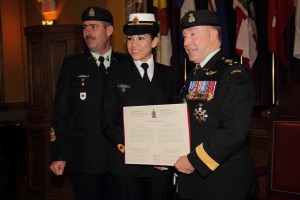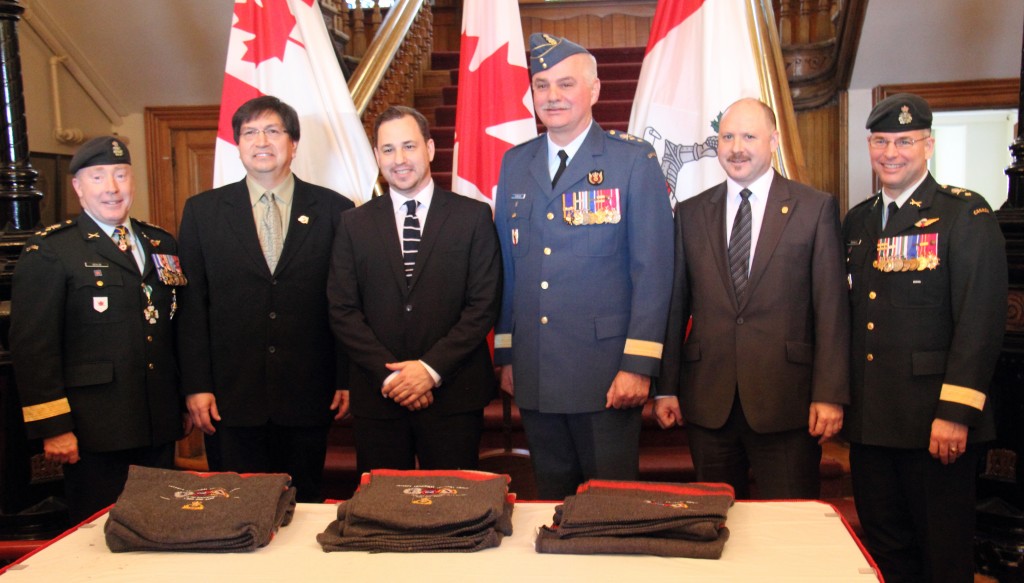ALOY Program Reaches New Heights
Milestones Reached for Aboriginal People at the Royal Military College of Canada
Article by Captain Yvette Grygoryev
Photos by 25366 Mike Shewfelt
 A Commissioning Ceremony held this past week (January 10, 2013) at the Royal Military College of Canada marked a significant milestone for one former Naval Cadet, Nicole Shingoose. With her new commission, Acting Sub-Lieutenant Shingoose is the first aboriginal Cadet to commission from the College who began with the Aboriginal Opportunity Leadership Year (ALOY) program and will set another precedent as she graduates in May.
A Commissioning Ceremony held this past week (January 10, 2013) at the Royal Military College of Canada marked a significant milestone for one former Naval Cadet, Nicole Shingoose. With her new commission, Acting Sub-Lieutenant Shingoose is the first aboriginal Cadet to commission from the College who began with the Aboriginal Opportunity Leadership Year (ALOY) program and will set another precedent as she graduates in May.
Shingoose explained that she joined the ALOY program in what is affectionately known as the guinea pig year – the very first year of the program.
“Right now the program is in its prime and most of the new Cadets in this program want to be here for school,” she said.
“I can just feel this energy. I can see the discovery and see the drive,” she said, describing the current Cadets in the ALOY program.
The ALOY program was created in August 2008 to provide a military education and learning experience for members of aboriginal communities in Canada. ALOY is one of several programs created to demonstrate to aboriginal communities in rural, urban and remote locations that the Canadian Forces offers a fair and equitable environment in which to serve.
Acting Sub-Lieutenant Shingoose has lived in Saskatchewan on the Plains Cree Moosimin Reserve most of her life and heard about the ALOY program through the high school Raven program, a military summer camp program for high school students.
In 2008 her Raven group was given a presentation on the ALOY program, and for Shingoose it seemed like a great opportunity, so she applied.
“At that time the program was new for everyone,” Shingoose explained.
Although the ALOY program is still a fledgling in some respects, aboriginals and First Nations peoples have fought for Canada since the war of 1812. They went on to fight in the First and Second World Wars, building a long history of military service.
That service will continue through RMC with the signing of a memorandum between the ALOY advisory council and RMC, to continue to support the ALOY program. The agreement will help ensure ALOY remains responsive to Aboriginals and the needs of the Canadian Armed Forces. Along with RMC Commandant Brigadier-General Eric Tremblay, the agreement was signed by the Council including Inuit Tapiriit Kanatami Executive Director Stephen Hendrie, National Association of Friendship Centres Executive Director Jeffrey Cyr and Congress of Aboriginal Peoples National Vice-Chief Ron Swain on behalf of the National Chief, Ms. Betty Ann Lavallee (CD).
The ALOY program strives to provide aboriginal cadets with the opportunity to excel in the four cornerstones that are at the core of life at RMCC – Leadership, Academics, Military Training, and Athletics.
Regardless of whether they choose to continue studies at RMCC at the conclusion of their one-year program, the experience gives them excellent leadership experience. Many go back to their communities as mentors to aboriginal youths, and are in a better position to assume leadership roles in their communities.
For Shingoose the challenge to continue her studies at the Royal Military College of Canada was irresistible.
She applied to RMC for undergraduate studies and later this spring will be the first aboriginal to graduate after beginning with the ALOY program.
Acting Sub-Lieutenant Nicole Shingoose says she has learned so much, and that it all began with a challenge she set herself, to see if she could make it.
“I just wanted to see if I could do it. I was proving to myself that I could take pride in what I could accomplish and also in being Cree,” she also said.
According to Shingoose, despite a familiar environment created by the ALOY program there are still some challenges that must be faced in the program, including the great diversity in dialects between the First Nations people.
“They try their best but it might be helpful to link up with the Queen’s University’s Four Directions Aboriginal Student Center,” Shingoose suggests.
One of the greatest recent additions to the ALOY program is Elder Bernard Nelson and the biggest change is to the spiritual component of the program. “If the cadets are having problems of any kind, his presence reinforces a positive sense of community,” Shingoose said.
For many of the cadets who come to RMCC from small communities, the culture can differ significantly.
Shingoose is not daunted by these differences though, and plans to encourage youth in her community to apply to the summer basic program and believes the experience would be positive for them.
“I hope that they can be mentored and I can explain that this is for us. I can do that, and take away the doubt,” she said
When asked if she had words of advice to young people from aboriginal communities she said that young people must represent themselves well, because any other behavior feeds the stereotypes and that’s not part of the College mentality.
New Officer a First for CF – Article by the Kingston Whig Standard
